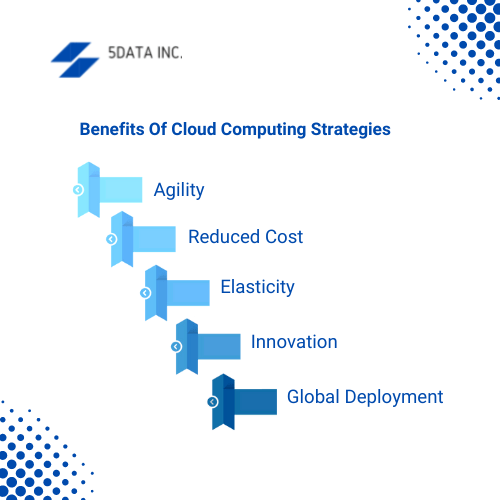Many organizations are turning towards cloud computing as a weapon for deploying fast-to-market solutions in business-related critical workloads and workflows. But if an organization adopts cloud services without a proper cloud strategy and implementation structure, it will not be effective and may create business problems. So proper planning of cloud technology, cloud computing services, and customer relationship management plays a very important role for an enterprise in making smart and dynamic decisions regarding cloud solutions, cloud migration process, and computing resources.Platform engineering is the process that makes the deployment and operations of applications easy and convenient.
Top 7 Types Of Cloud Strategies
A cloud strategy is a brief explanation of the role of the cloud in any organization. The use of cloud computing in organizations for emerging technologies, getting the storage space for data security and data portability for their business and project files.
5Data Inc strongly believes that data is the essence of an organization. They also maintain the security of the data by using appropriate tools and techniques. There are multiple clouds used strategically for large data of your business, such as
- Infrastructure as a service- IaaS is a cloud computing service that helps reduce maintenance on-premises data centers and cost efficiency in implementing the hardware by managing multi-cloud environments. Its solutions give us the flexibility to scale the technology’s demand in the market. Selecting the proper cloud service provider is very important to entrust the organization’s storage resources. Major cloud service providers include Amazon Web Services, IBM Cloud, Google Cloud, and Microsoft Azure.
- Software as a service- This cloud service provider helps the user to use cloud-based apps by connecting to the internet without the buffering time to download or install any software. The service provider works on the hardware and software with the formal agreement of service and also gives assurance for the security to store data and the availability of an app to save sensitive data. The cloud provider should always be an expert in regulatory compliance to fulfill the company’s requirements.
- Platform as a service- No application works effectively without a proper strategy. PaaS is one of the cloud computing models wherein a third-party provider handover the required hardware and software tools for application development. It is also known as a cloud services platform with a bunch of services like cloud deployment, scaling automation, application management, and the development of tools that can be used.
- Hybrid cloud and multi-cloud- Hybrid cloud model is one of the computing environments that connect the organization’s private cloud services and cloud vendor’s public cloud services in one place in a single application, which is easy and flexible to be accessed. Adopting a hybrid cloud solution makes it easier to fulfill the technical and business goals and cost efficiency compared to the private and public cloud solutions working individually. Using multi-cloud is an advantage of working on the application differently based on the requirement and companies to avoid vendor lock-in. Cloud vendors like Oracle and Google offer SaaS-based ERP systems and digital oceans.
- Big data analytics- Adopting a cloud computing service, companies can acquire powerful insights and optimize business processes through big data analytics. Cloud computing allows an organization to step into quantities of structured and unstructured data and is also advantageous for extracting business values. Machine learning and Artificial intelligence are the two possible key performance indicators of successful cloud computing.
- Cloud storage- This is the storage where the data, files, and projects are saved automatically. Companies can opt for data storage with cloud storage instead of maintaining separate data centers, which helps in cost efficiency. Companies can also store files on-premises, hybrid or private cloud models by following the cloud security procedure.
- Disaster recovery- Cloud computing is one of the best strategies wherein we can restore the data of business and any files related to the companies with the internet connection. Disaster recovery can be perfectly managed through the cloud.
Objectives of Cloud Strategies
- Every organization should define the activities and the roles and responsibilities for effective use of cloud computing.
- Provide a business with a proper enterprise cloud strategy and decision-making to determine the multiple opportunities in the cloud platforms.
- Establish and enhance cloud implementation strategies.
- Determine the objectives, measures, and key initiatives that can help the business in continuous integrity and diversity.

Benefits Of Cloud Computing Strategies
In the present day of business, every industry must meet increasing demands for faster delivery, heightened production, and customer satisfaction. Cloud-based technology can help manufacturers and other industries meet their needs. The cloud allows businesses access to flexible ‘unlimited’ data storage space. Productivity and flexibility are very important in making the work easier to access information from different locations and devices.
There are multiple reasons for organizations to move to cloud strategies, which include
- Agility: Depending on data availability, expanded analytics capabilities allow organizations to act on real-time data and identify and solve issues.
- Reduced Cost: Compared to the traditional or manual work system, cloud-based solutions are extremely lesser for paying expensive upfront hardware or high IT support fees. Businesses only pay for the resources they use.
- Elasticity: Cloud strategy provides the ability to allocate resources dynamically. They also help to address the changing demands. Through cloud elasticity, one can avoid over provisioning or under-provisioning an application.
- Innovation: It is easier for the teams to focus on developing and executing applications when needed to run the business effectively in a unique way.
- Global Deployment: Businesses expand globally on cloud-based systems, which helps the business to grow exponentially.
Conclusion
Cloud strategies play a very important role in appropriately running the business. Using proper infrastructure, other technical tools, and platform engineering makes coding patterns and software developments easier and more effective than traditional methods. 5Data Inc is a Hybrid cloud development company that strives to help organizations to make decisions effectively. 5Data Inc provides Data life cycle management services, which help gather, scrutinize, transform, and tabulate the data. Their engineers and experts keenly observe and understand the business’s requirements to achieve the desired results.

Fathima Shazad
Author
